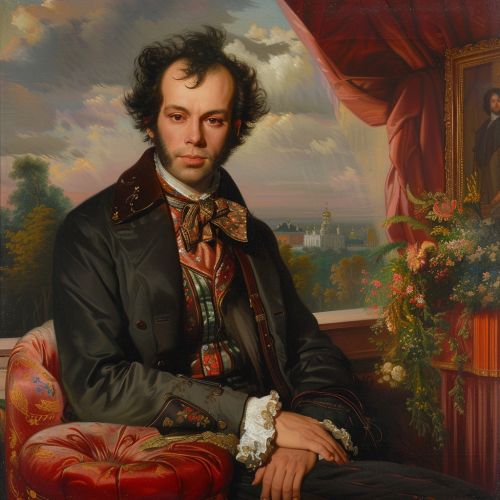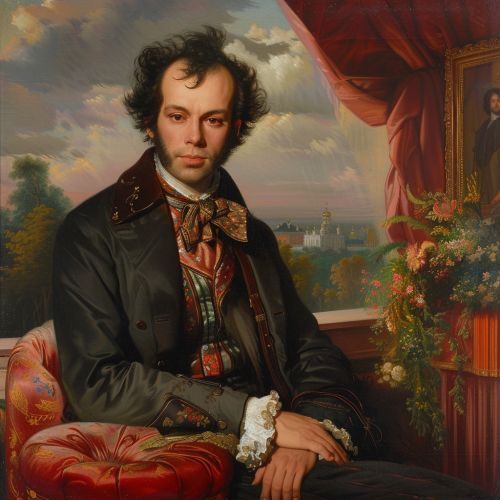Alexander Pushkin: Difference between revisions
(Created page with "== Early Life and Education == Alexander Sergeyevich Pushkin was born on June 6, 1799, in Moscow, Russia, into a noble family. His father, Sergei Lvovich Pushkin, was a retired major, and his mother, Nadezhda Osipovna Gannibal, was the granddaughter of Abram Petrovich Gannibal, an African who became a prominent military engineer in Russia. Pushkin's upbringing was heavily influenced by his grandmother, Maria Alekseyevna, who introduced him to Russian folklore and fa...") |
No edit summary |
||
| (One intermediate revision by the same user not shown) | |||
| Line 11: | Line 11: | ||
Pushkin's literary career began in earnest during his time at the Lyceum. His first published poem, "To My Friend, the Poet," appeared in 1814. However, it was his poem "Ruslan and Ludmila," published in 1820, that brought him widespread recognition. This narrative poem, based on Russian folklore, showcased Pushkin's mastery of the Russian language and his ability to blend traditional themes with innovative poetic forms. | Pushkin's literary career began in earnest during his time at the Lyceum. His first published poem, "To My Friend, the Poet," appeared in 1814. However, it was his poem "Ruslan and Ludmila," published in 1820, that brought him widespread recognition. This narrative poem, based on Russian folklore, showcased Pushkin's mastery of the Russian language and his ability to blend traditional themes with innovative poetic forms. | ||
[[Image:Detail-97219.jpg|thumb|center|Portrait of Alexander Pushkin in a 19th-century Russian setting, wearing period clothing.|class=only_on_mobile]] | |||
[[Image:Detail-97220.jpg|thumb|center|Portrait of Alexander Pushkin in a 19th-century Russian setting, wearing period clothing.|class=only_on_desktop]] | |||
=== Exile and Maturity === | === Exile and Maturity === | ||
Latest revision as of 13:58, 26 July 2024
Early Life and Education
Alexander Sergeyevich Pushkin was born on June 6, 1799, in Moscow, Russia, into a noble family. His father, Sergei Lvovich Pushkin, was a retired major, and his mother, Nadezhda Osipovna Gannibal, was the granddaughter of Abram Petrovich Gannibal, an African who became a prominent military engineer in Russia. Pushkin's upbringing was heavily influenced by his grandmother, Maria Alekseyevna, who introduced him to Russian folklore and fairy tales, which later became a significant influence on his literary works.
Pushkin received his early education at home, where he was tutored in French, Russian, and Latin. In 1811, he was enrolled in the prestigious Imperial Lyceum in Tsarskoye Selo, near St. Petersburg. The Lyceum was known for its rigorous academic curriculum and emphasis on liberal arts, which played a crucial role in shaping Pushkin's literary talents. During his time at the Lyceum, Pushkin began to write poetry and became acquainted with the works of European writers such as Voltaire, Byron, and Shakespeare.
Literary Career
Early Works
Pushkin's literary career began in earnest during his time at the Lyceum. His first published poem, "To My Friend, the Poet," appeared in 1814. However, it was his poem "Ruslan and Ludmila," published in 1820, that brought him widespread recognition. This narrative poem, based on Russian folklore, showcased Pushkin's mastery of the Russian language and his ability to blend traditional themes with innovative poetic forms.


Exile and Maturity
In 1820, Pushkin was exiled to the Caucasus and Crimea due to his politically charged poems, which criticized the Russian government. During his exile, he continued to write prolifically, producing works such as "The Prisoner of the Caucasus" and "The Fountain of Bakhchisaray." These poems reflect his fascination with the exotic landscapes and cultures he encountered during his travels.
Upon his return from exile in 1824, Pushkin settled in his family estate in Mikhaylovskoye. It was during this period that he wrote some of his most significant works, including the verse novel "Eugene Onegin." This novel, written in a unique stanza form known as the "Onegin stanza," is considered one of the greatest achievements in Russian literature. It explores themes of love, fate, and the clash between individual desires and societal expectations.
Later Works and Legacy
In the late 1820s and early 1830s, Pushkin continued to produce a diverse array of literary works, including the historical drama "Boris Godunov" and the narrative poem "The Bronze Horseman." His works during this period reflect his deepening engagement with Russian history and culture, as well as his growing interest in prose fiction.
Pushkin's influence on Russian literature cannot be overstated. He is often referred to as the "father of Russian literature" due to his pioneering role in developing the modern Russian literary language. His works have inspired countless writers, including Fyodor Dostoevsky, Leo Tolstoy, and Nikolai Gogol.
Personal Life and Death
Pushkin's personal life was marked by numerous romantic entanglements and financial difficulties. In 1831, he married Natalia Goncharova, a renowned beauty of the Russian court. Their marriage, however, was fraught with tension, partly due to Pushkin's jealousy and Natalia's flirtations with other men.
In 1837, Pushkin was fatally wounded in a duel with Georges d'Anthès, a French officer who had allegedly been courting Natalia. Pushkin's death at the age of 37 was a significant loss to Russian literature. He was buried at the Svyatogorsky Monastery near his family estate in Mikhaylovskoye.
Literary Style and Themes
Pushkin's literary style is characterized by its clarity, precision, and musicality. He was a master of various poetic forms, including the sonnet, the elegy, and the narrative poem. His prose works, such as "The Captain's Daughter" and "The Queen of Spades," are noted for their vivid characterizations and intricate plots.
One of the central themes in Pushkin's work is the tension between individual freedom and societal constraints. This theme is explored in "Eugene Onegin," where the protagonist's desire for personal autonomy leads to his isolation and eventual downfall. Pushkin also frequently addressed themes of love, honor, and the passage of time, often drawing on his own experiences and observations of Russian society.
Influence and Reception
Pushkin's influence on Russian literature and culture is profound. His works have been translated into numerous languages and continue to be studied and celebrated worldwide. Pushkin's ability to blend classical forms with Russian vernacular speech set a new standard for literary excellence in Russia.
Critics and scholars have praised Pushkin for his innovative use of language and his ability to capture the complexities of human emotion. His works have been the subject of extensive academic study, with scholars examining his contributions to various literary genres, his engagement with historical and cultural contexts, and his impact on subsequent generations of writers.
See Also
- Russian Literature
- Eugene Onegin
- Boris Godunov (play)
- The Bronze Horseman (poem)
- Fyodor Dostoevsky
- Leo Tolstoy
- Nikolai Gogol
